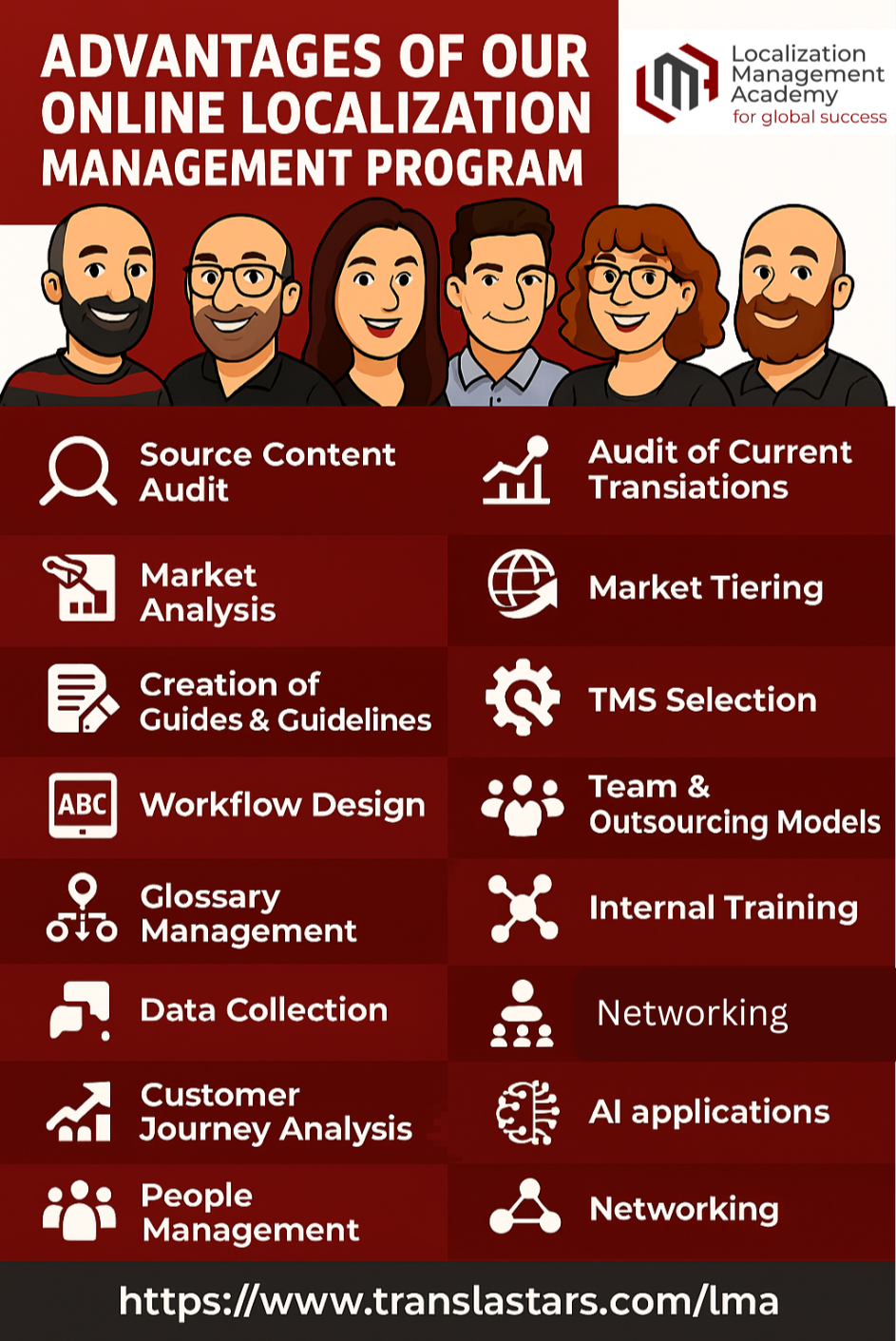In a reflection of her own journey as a best-selling author, Elizabeth Gilbert clearly distinguishes the terms hobby, job, career, and vocation. Terminology goes hand-in-hand with localization, and understanding how we as professionals relate to these terms can support us in clarifying how we can grow, evolve, and sustain ourselves in the industry.
Most of us have jobs, which earn us money. Some of us have careers, vocations, and/or hobbies. In a quickly changing world and with evolving employment markets, the shift from a job to a career is an open invitation to create a plan for yourself.
Specializing in a niche is a great way to secure work and develop a career. Yet, despite planning to specialize, as industries transform, you don’t want to end up stuck between keeping the role you’ve had for years and no income at all.
TranslaStars helps professionals across the localization industry to gain new perspectives and skills, all of which support career growth.
Our free course Re-inventing Your Localization Career offers interactive exercises to help professionals define their needs and growth plans that gives them a career they’re excited to continue developing.
Most of us have jobs, which earn us money. Some of us have careers, vocations, and/or hobbies. In a quickly changing world and with evolving employment markets, the shift from a job to a career is an open invitation to create a plan for yourself.
Specializing in a niche is a great way to secure work and develop a career. Yet, despite planning to specialize, as industries transform, you don’t want to end up stuck between keeping the role you’ve had for years and no income at all.
TranslaStars helps professionals across the localization industry to gain new perspectives and skills, all of which support career growth.
Our free course Re-inventing Your Localization Career offers interactive exercises to help professionals define their needs and growth plans that gives them a career they’re excited to continue developing.
From our course tutor, Stephen Nock of &joy Coaching, here are 4 reasons why you might benefit from refining your approach and re-inventing your career:
1. Industries Change, and You Want to be Adaptable
The pace of change in the world today means that, to grow a career in any field, professionals need to respond to shifts in technology, sociocultural trends, economic demands, and environmental factors.
Localization professionals in particular have experienced evolutions in technology that required adaptability, long before the advent of artificial intelligence tools and machine translations. Like any cultural artefact, languages evolve to stay relevant to a social system. As some of the people that interact with languages most closely, localization professionals are best equipped to thrive when they are ready to evolve, too.
It may support you to think of your adaptability not as a burdensome requirement, but as an asset to what you can offer to clients and employers.
It may support you to think of your adaptability not as a burdensome requirement, but as an asset to what you can offer to clients and employers.
Seeing how AI is changing our world and more specifically how it is impacting localization there is an opportunity to grow and take the reins in a new field of expertise.
2. DisComfort Zone = Growth
Even if AI doesn’t “take your job,” you might outgrow it...!
Staying inside your comfort zone and only doing work that you 100% know you can do carries the risk of avoiding opportunities for growth. It’s important to experiment with new challenges, to learn new skills, to explore new subjects, texts, or tools. Not only does this equip you with the skills; you are training your brain to keep evolving. Even for folks approaching retirement, who might be less motivated to learn skills or change jobs, challenging the mind cultivates neuroplasticity, which is especially important to exercise in later life years.
The only thing worse than monotonous work that you could do in your sleep is unexpectedly finding out that you’ve run out of said work and need to find something else. When you have the chance to write your own narrative, adopting a victim mindset is a slippery slope. Change doesn’t have to be a surprise; it can be choice.
Staying inside your comfort zone and only doing work that you 100% know you can do carries the risk of avoiding opportunities for growth. It’s important to experiment with new challenges, to learn new skills, to explore new subjects, texts, or tools. Not only does this equip you with the skills; you are training your brain to keep evolving. Even for folks approaching retirement, who might be less motivated to learn skills or change jobs, challenging the mind cultivates neuroplasticity, which is especially important to exercise in later life years.

Look for new working experiences that bring you a bit of excitement as well as a sense of discomfort. Why discomfort? Humans need to be challenged to evolve and to survive. Find - and proactive choose! - a professional challenge outside your comfort zone, and take charge of re-inventing yourself.
3. Everyone Wins When You Gain New Perspectives
Some diversification in your work portfolio helps you to showcase additional strengths and attract interest in your work. While you may choose to emphasize one area of excellence, having additional area(s) of interest and experience makes you a well-rounded applicant or candidate for future work contracts.
Much like having a “side hustle” can help mainstream professionals to explore a new creative outlet, it’s also attractive for prospective employers to see proactive initiative in people who explore outside their primary field.
If you primarily focus in legal text, maybe you take a pro-bono project or simply do volunteer work with a charity a few times a year. Now you’ve familiarized yourself with at least two types of organizations.
If you’ve learned to specialize in proofreading, maybe you create a course - or tutor colleagues - to explain to others the best practices you’ve learned. Now you’re an editor and a teacher.
Rather than mastering one specialty, gain familiarity in more than one area to secure professional opportunities and possibly even diverse streams of income. Our course catalog includes free and paid course options to grow your localization career. As you learn new skills, you diversify your profile and become more employable in the long-term.

A good example of acquiring new skills is the Localization Management Academy and the courses offered there, mainly the Localization Management Porgram that prepares you to become a leader in the localization industry.
4. Experience Teaches You Empathy Which Makes You a Better Collaborator
As we talk about in the fundamental skills of Translation and Localization Managers, you likely need “strategic, linguistic, financial, technical, data analytic, and (very often) people management skills”.
While it may not seem possible to be an expert in every area, you have the possibility to connect yourself to experts. When you connect and learn the perspectives of others, you’re able to take their point of view into account when planning your own work. When a project’s budget is reduced, knowing how a “finance person” thinks helps you to get creative without feeling like a victim. When your instance fails to sync with the client’s CAT tool, having a little insight into the project’s technical configuration (or someone to ask without feeling ashamed) will help you respond responsibly rather than react in panic.
To develop your skills as a localization professional, it helps to network with and to understand the perspectives of others. Adopt a mindset of curiosity and ask yourself, “why might someone else see this differently?” Take courses or get to know other localization professionals, just to walk in someone else’s shoes.
Conclusion
The free course Re-inventing Your Localization Career includes guided, interactive exercises to define your support system, and your support system is one of the resources that helps you see things from new perspectives.
We know the localization industry is evolving quickly, and we don’t want anyone to feel like they have to be a victim of the environment.
Even in the face of change, we want to support localization professionals to feel empowered to create their working journey. TranslaStars has partnered with &joy Coaching to offer this course for free to help you proactively navigate the language industry and sharpen your skills. Like coaching, the course supports you to define action in the direction of the professional goals you want to achieve. If you’re not sure what your goals are yet, we’ll start to define them together.
Even in the face of change, we want to support localization professionals to feel empowered to create their working journey. TranslaStars has partnered with &joy Coaching to offer this course for free to help you proactively navigate the language industry and sharpen your skills. Like coaching, the course supports you to define action in the direction of the professional goals you want to achieve. If you’re not sure what your goals are yet, we’ll start to define them together.
Whether you think of your localization work as a job, a career, a vocation, or a hobby, you’ll position yourself well by developing empathy for others, diverse project experiences, challenging your comfort, and strengthening your resilience. These are just a few of the strong skills that your coach, Stephen Nock, will help you cultivate in the free course, Reinventing Your Localization Career.





